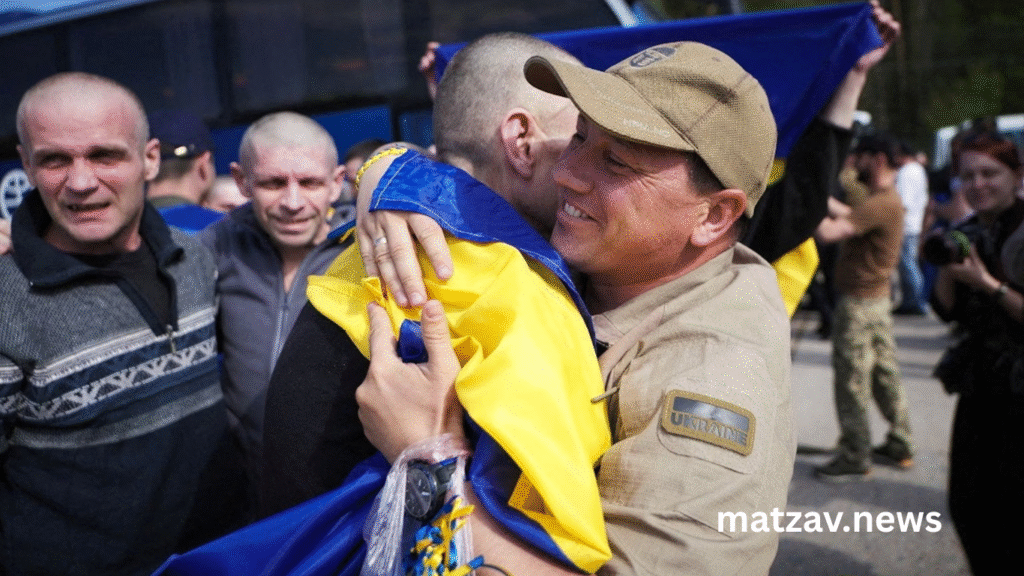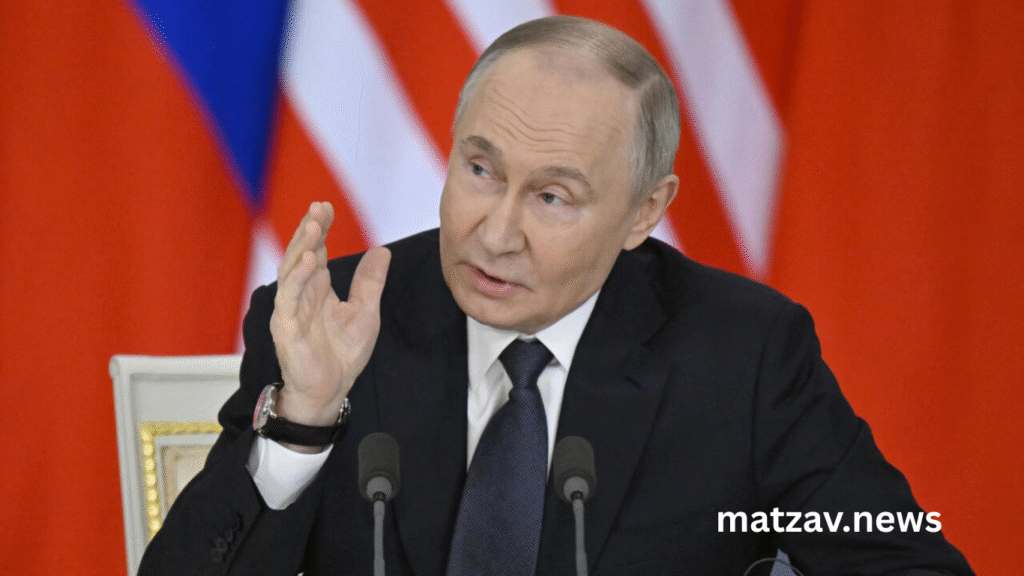Former U.S. President Donald Trump has publicly criticized Russian President Vladimir Putin, labeling him “crazy” in response to Russia’s most devastating airstrike campaign on Ukraine since the full-scale invasion began in 2022. The remarks were made during a rally in New Jersey, marking a rare and sharp condemnation from Trump, who has previously drawn scrutiny for appearing lenient toward the Russian leader.
Read More : Explosions in Kashmir After India-Pakistan Ceasefire
The comments came just hours after Ukrainian officials reported over 100 missiles and drones launched across major cities, killing dozens and damaging critical infrastructure. Trump’s statement has sparked global attention, not only for its content but also for the potential shift in his rhetoric amid intensifying geopolitical tensions. Analysts are watching closely as the U.S. presidential race heats up and foreign policy becomes a focal point.
Trump’s Sharp Criticism of Vladimir Putin
A Sudden Departure from Previous Praise
Donald Trump’s labeling of Putin as “crazy” represents a significant deviation from his earlier tone. Throughout his presidency, Trump frequently praised Putin’s leadership style, calling him “strong” and “savvy.” This new language contrasts sharply with those past accolades, prompting political analysts to reevaluate Trump’s stance on Russia and its leader.
While some see this as a strategic pivot to appeal to moderate voters ahead of the 2024 election, others interpret it as a genuine reaction to the horrors of the recent Russian assault on Ukraine. Either way, the shift in tone is noteworthy and could influence how Trump’s foreign policy credentials are perceived moving forward.
Timing of the Remarks Amid Heightened Conflict
Trump’s statement came shortly after Ukraine endured the most significant wave of Russian missile and drone attacks in over a year. According to Kyiv’s military, dozens were killed, hundreds injured, and key power stations were destroyed. The unprecedented attack drew condemnation from the international community and now, notably, from Trump himself.
His remarks were made during a campaign event where foreign policy and national defense were central talking points. In calling Putin “crazy,” Trump sought to portray himself as brutal on authoritarian leaders, possibly countering criticisms of his past foreign relations strategy.
Most significant Russian Attack on Ukraine Since Invasion

Scope and Impact of the Airstrikes
Ukrainian officials confirmed that over 110 missiles and drones struck multiple regions, including Kyiv, Kharkiv, and Dnipro. Residential areas, hospitals, and energy infrastructure suffered extensive damage. Emergency services scrambled to contain fires, provide medical aid, and restore essential services.
The strike is being described as one of the deadliest since Russia began its full-scale invasion in February 2022. President Volodymyr Zelensky called the assault a “calculated act of terror” and urged Western allies to expedite military aid, particularly air defense systems.
Civilian Toll and Humanitarian Concerns
Dozens of civilians, including children, were reported dead or injured. Hospitals in affected cities were overwhelmed, while thousands sought shelter in subway stations and underground bunkers. International humanitarian organizations have sounded the alarm, calling for urgent medical supplies and reconstruction assistance.
Amnesty International and Human Rights Watch have condemned the attack, urging the global community to investigate potential war crimes. The humanitarian fallout from the attack is expected to worsen in the coming weeks as infrastructure remains crippled.
Global Reactions to the Russian Offensive
U.S. and NATO Responses
President Joe Biden condemned the airstrikes as “barbaric” and reaffirmed America’s commitment to Ukraine’s defense. The Pentagon announced the acceleration of an upcoming $400 million aid package, including Patriot missile systems and anti-drone technology.
NATO Secretary-General Jens Stoltenberg reiterated the alliance’s support, stating that Russia’s actions further validate the importance of Ukraine’s integration into Western defense frameworks. Several NATO countries, including the UK and Germany, pledged additional assistance.
European Leaders Condemn Russia’s Escalation
European Union leaders issued a joint statement denouncing the attacks as “an unacceptable escalation of violence.” French President Emmanuel Macron called for a United Nations emergency session to address the situation, while Germany’s Olaf Scholz emphasized the urgency of increasing sanctions against Moscow.
The EU is also coordinating with humanitarian agencies to deliver aid to affected regions. Across the continent, there is renewed urgency to bolster both military and humanitarian support for Ukraine amid fears of further aggression.
Trump’s Foreign Policy Record in Spotlight
Legacy of Trump’s Russia Relations
During his time in office, Trump’s approach to Russia was often marked by ambiguity. While his administration imposed sanctions on Moscow, Trump himself rarely criticized Putin, leading to bipartisan concern over his foreign policy instincts. His latest remark could be seen as an attempt to rewrite that narrative.
Critics argue that Trump’s past actions, including his reluctance to acknowledge Russian election interference, complicate his current rhetoric. Supporters, however, claim that Trump maintained global peace through “strategic unpredictability” and assert that he would have deterred the current war had he remained in office.
Trump’s Statement May Influence the 2024 Election
With the U.S. presidential election looming, Trump’s evolving stance on Russia may play a critical role in shaping voter opinion. Foreign policy, especially involving Ukraine, is becoming a key campaign issue, particularly as American military support faces increasing scrutiny from conservative factions.
Trump’s condemnation of Putin could help broaden his appeal among undecided voters and moderate Republicans. At the same time, it risks alienating segments of his base who favor a more isolationist foreign policy stance.
Putin’s Strategy and Response to Global Condemnation

Kremlin’s Justification for the Attack
The Kremlin has defended the recent assault as a necessary military operation targeting “Ukrainian command centers and arms depots.” Russian officials denied allegations of civilian targeting, blaming collateral damage on Ukraine’s air defense systems.
Despite mounting evidence and global outrage, Moscow continues to frame its actions within the context of national security and “demilitarization.” Analysts suggest the strike may also serve as a domestic propaganda tool to rally support among Russian citizens amid a prolonged conflict.
International Legal Ramifications
Legal experts are calling for international tribunals to investigate potential war crimes. If proven, this could place further pressure on the International Criminal Court to prosecute Russian leaders. Ukraine has submitted new evidence to The Hague and urged global partners to support legal accountability.
The legal outcomes of these investigations could shape the future conduct of international military conflicts and reaffirm the importance of war-time conventions.
Ukraine’s Strategic Challenges and Military Needs
Ukrainian Response and Military Readiness
Ukraine’s military quickly mobilized air defense systems to intercept further attacks, successfully neutralizing several incoming drones and missiles. However, the scale of destruction highlighted vulnerabilities in the country’s defense infrastructure.
President Zelensky has repeatedly called for faster delivery of promised Western weapons. Military analysts argue that advanced missile defense systems and long-range artillery are critical for Ukraine to maintain its sovereignty and resist further Russian advances.
Rising Domestic Pressures on the Zelensky Administration
Internally, Zelensky faces mounting pressure to demonstrate effective crisis management. Ukrainian citizens, while resilient, are increasingly strained by constant bombardment, displacement, and economic hardship.
There is also a growing chorus within the Ukrainian parliament for more transparent communication about military strategies and civilian protections. The government’s ability to manage both war-time operations and humanitarian crises remains under intense scrutiny.

Frequently Asked Questions
What did Trump say about Putin recently?
Donald Trump called Vladimir Putin “crazy” in a public statement following a massive Russian attack on Ukraine, marking a notable shift in his rhetoric.
Why is Trump’s comment significant?
This is significant because Trump has historically avoided directly criticizing Putin. This departure may influence voter perception and foreign policy debates.
What happened during the recent Russian attack on Ukraine?
Russia launched over 100 missiles and drones across major Ukrainian cities, causing mass casualties and widespread infrastructure damage.
How has Ukraine responded to the attacks?
Ukraine activated its air defense systems, sought additional Western aid, and condemned the attack as a deliberate act of terror.
What is the international community saying about the attack?
World leaders, including those from NATO and the EU, have condemned the strike and pledged continued support for Ukraine.
How might Trump’s comment affect his 2024 campaign?
It may help him appeal to moderates concerned with national security but could also alienate isolationist voters within his base.
What are the legal implications of Russia’s actions?
International law experts are pushing for war crimes investigations and potential prosecution of Russian leadership at the ICC.
Is Ukraine receiving enough support from the West?
Ukraine has received substantial military and humanitarian aid, but officials argue that delays and shortages remain critical issues.
Conclusion
Donald Trump’s “crazy” remark about Vladimir Putin amid Russia’s deadliest assault on Ukraine marks a dramatic turn in his foreign policy tone. As Ukraine reels from the latest attacks and global powers respond, Trump’s rhetoric could shape both the 2024 election and future international alignments.
